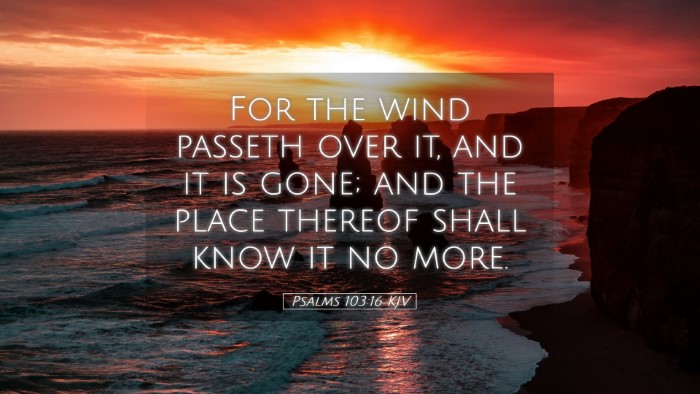Psalms 103:16 Commentary
Psalms 103:16 (KJV): "For the wind passeth over it, and it is gone; and the place thereof shall know it no more."
Introduction
This passage from Psalms 103 encapsulates the transient nature of human life and the temporal existence that we experience in our earthly journey. The verse serves as a poignant reminder of mortality and the fleeting moments that define our lives. In this commentary, we will explore insights from notable public domain commentaries, including those of Matthew Henry, Albert Barnes, and Adam Clarke, to elucidate the depth and meaning of this scripture.
The Transience of Life
Matthew Henry elaborates on the notion of our lives being akin to grass or a flower. It blossoms for a while but is ultimately subject to the whims of nature, represented here by the wind. He suggests that the wind, which is unseen and often uncontrollable, is a fitting metaphor for the events that sweep through our lives, leading to our eventual demise. This imagery is striking and emphasizes our fleeting existence within the vast timeline of creation.
Albert Barnes also picks up on this theme, noting that just as the grass withers and fades, so too do our lives. He stresses the idea that human pride and grandeur might be likened to this ephemeral state, a call to humility in recognizing our limitations.
God’s Eternal Nature in Contrast
In contrast to the transience of human life, both Henry and Barnes highlight the permanence and eternal nature of God. While we are here today and gone tomorrow, God remains unchanged and everlasting. Clarke emphasizes that the recognition of this disparity should cause the believer to place their trust in things eternal rather than the temporary pleasures of life. It reminds us to pursue the spiritual over the material since the latter is continually subject to change.
Theological Implications
The verse carries significant theological implications, particularly about the concept of mortality and the afterlife. Adam Clarke posits that this realization should not evoke despair but rather a greater appreciation for the grace and mercy of God. He argues that while life is fleeting, the promise of eternal life through faith in Christ contrasts sharply with the temporal nature of our earthly existence.
This dynamic invokes an important perspective for pastors and theologians: the need to frame discussions around mortality in a way that emphasizes hope and redemption. The consequence of sin and the inevitable end can be daunting, yet they are balanced by the promise of salvation. This should encourage a faith-filled response to life's uncertainties.
Encouragement for Believers
In light of the passage, Matthew Henry encourages believers to reflect on their own lives and assess the weight of their earthly endeavors. He suggests that rather than being consumed by the fears of losing our temporal existence, we should invest in our spiritual life, which yields eternal dividends.
Barnes adds that understanding the impermanence of our earthly joys should illuminate our focus on God’s unwavering love and support. He posits that recognizing our vulnerability enhances our dependence on divine strength, urging believers to draw nearer to God and seek His presence in our transient experiences.
This understanding creates a sense of urgency to live purposefully, striving to bear fruit in our short time on earth. Clarke reinforces this by emphasizing the importance of living with a view to eternity. He asserts that our actions and choices have lasting spiritual implications, shaping our eternal destiny.
Practical Application
The insights gleaned from this verse challenge believers to live with intentionality. Here are some practical applications from the commentaries:
- Reflect on Mortality: Regularly contemplate the fleeting nature of life to foster a deeper appreciation for daily moments.
- Invest in Spiritual Growth: Allocate time and resources toward spiritual disciplines, such as prayer, Bible study, and fellowship.
- Encourage Others: Use your understanding of life's transience to encourage and uplift those around you, pointing them to the hope found in Christ.
- Live with Purpose: Make conscious choices that reflect your values and priorities, ensuring they align with God's eternal purposes.
- Share God's Love: Actively share the message of salvation and the eternal hope available through Jesus Christ.
Conclusion
Psalms 103:16 serves as a powerful reminder of the brevity of life and the importance of focusing on what is eternal. Commentaries from Matthew Henry, Albert Barnes, and Adam Clarke shed light on this rich verse, helping us to understand that while we may pass away like the wind, God’s love and His promises endure forever.
As believers, we are encouraged to anchor our lives in the truths of scripture, recognizing that our hope and security do not reside in our transitory experiences but in the unchanging nature of God. Therefore, let us strive to live in a manner worthy of our calling, reflecting the eternal values of the Kingdom of God.


